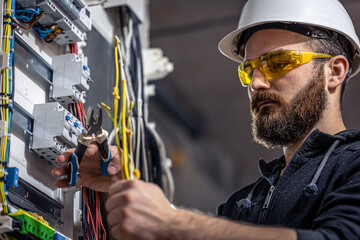Home » Posts tagged 'generator installations'
Tag Archives: generator installations
Electrical Services You Should Know
If you need to install electrical services in your home, there are a number of things you should know. Among them are installing outlets and switches, replacing a bus bar, and rewiring an electrical panel.

A working outlet is a necessity in today’s world. It allows you to charge your cell phone, turn on your lights and even power up your computer. However, a faulty or malfunctioning one can be a fire hazard. To protect yourself, it’s a good idea to contact a professional at https://phoenixsharpelectric.com for the job.
A switch is the heart of an electrical circuit. The most basic of these is the light switch, which is responsible for turning all your home’s lights on and off. You can also install dimmers and timers on light switches.
Another noteworthy occurrence is installing a smart outlet and switch. These devices are designed to control power to appliances remotely. They can also automate lighting schedules and power up your appliances if your Wi-Fi fails.
The replacement of a circuit breaker may be a good idea for a number of reasons. It is an inexpensive way to keep your family safe and save on the costs of emergency outages. It is also a good idea if you need to perform frequent repair work on your electrical panel.
There are many different types of circuit breakers. There are GFCI (Ground Fault Circuit Interrupter) breakers, hi-amp circuit breakers, and blade circuit breakers. When choosing a new breaker, be sure to check its amperage rating. This will help determine which one will be the best for your needs.
When it comes to a circuit breaker, the newest and best model is generally not the answer. Even a circuit breaker that’s been working for years can begin to show signs of deterioration. For example, a broken or worn wire can lead to dangerous overheating.
A bus bar is a metal strip used to complete an electrical circuit. It may be enclosed in an isolated-phase bus or it may be wrapped in insulation.
Typically, a bus bar is used to connect high-voltage equipment at electrical switchyards. It is also used for connecting low-voltage equipment in battery banks.
In addition, bus bars are used in manufacturing settings. These systems are less expensive to operate than block-and-cable power distribution. They are also a safer alternative.
Bus bars are generally insulated to prevent accidental contact. They provide additional security during short-circuit situations.
When replacing a bus bar, ensure that you follow safe working practices. You must also avoid touching a live wire. This can lead to serious injury.
For example, if your electrical service panel contains a main breaker, you must shut off the main power supply before you can replace it. You should use a flashlight to turn off the breaker.
Rewiring an electrical panel can be expensive. Not only are the risks of electric shock and fire high, but improper rewiring can cause the entire system to fail. This process should be left to a licensed electrician or a professional electrical contractor.
Many factors can affect the price of an electrical panel. You may want to upgrade a panel to add more circuits, to run new appliances, or to improve overall safety. These upgrades will increase the value of your home.
The total cost of upgrading a panel can range from around $1,230 to $4,500. This cost includes the labor and materials necessary to complete the job. However, it can vary depending on the panel’s location and the amount of work needed.
Generally, the best option is to hire a reputable and reliable electrical service to handle the work. It would be best if you were sure to ask your contractor how much the permit costs. Some towns require homeowners to have the electrical panel inspected and rewired before a permit can be issued.
A GFCI outlet is a circuit breaker that automatically shuts off electricity in a fraction of a second. It prevents electrical shock, electrocution, and water damage. These outlets are important in bathrooms, kitchens, garages, and wet areas.
When electricity comes in contact with water, the risk of a deadly electrical shock increases. GFCIs are a cheap and effective way to protect yourself from this type of danger. They detect the difference between the hot and neutral sides of the current and stop the flow when it gets too high.
If your GFCI outlet is not working, or if it frequently trips, you should hire an electrician to inspect the outlet. You may need to replace the outlet or add a new dedicated circuit.
GFCI outlets have been in use since the 1970s. They have become necessary in many homes to reduce the risk of electric shock and electrical fire.
The Benefits of Becoming an Electrician
An electrician design installs and maintains electrical power systems. They also inspect work to ensure it’s up to code. According to the Bureau of Labor Statistics, there were 655,840 electricians employed in May 2018. Electricians diagnose problems with wiring systems using test equipment and diagrams. They plan and install electrical fixtures and wires and safely use various hand and power tools. They must adhere to the National Electrical Code’s strict safety standards and regulations.

Electricians understand the electrical systems in buildings. They also understand and interpret blueprints, including technical diagrams of electrical systems. A licensed electrician uses various hand tools to run and protect wiring, including conduit benders. Power tools include screwdrivers, wire strippers, drills, and saws. And, of course, an electrician uses various tools to perform their tasks, from a voltmeter to a hammer.
A career in electrical construction dates back to the 1800s, but it’s still one of the most lucrative professions today. If you’re considering becoming an electrician, consider all the benefits this career offers. The average electrician earns $56,900 per year. And according to the Bureau of Labor Statistics, the number of electricians will grow by nine percent over the next ten years, creating nearly 66,100 new jobs.
A successful electrician must have excellent color vision. The color of its insulation identifies the wiring, and special markings are usually printed on the wire insulation. Troubleshooting electrical problems require good critical thinking skills and excellent communication skills. Physical strength and stamina are also essential. Ultimately, an electrician must have the ability to solve a complex electrical problem quickly. If you’re interested in this career, you must invest time in your education. There are many benefits to becoming an electrician, and it’s worth it.
An electrician must possess manual dexterity, good eye-hand coordination, and a good sense of balance. The job requires high physical endurance and the ability to work on a team with limited supervision. You’ll also need to be physically fit to lift and carry heavy equipment. And a good attitude is also essential to succeed in this field. And, of course, electrical equipment doesn’t come cheap. They’re not for the faint of heart, but they must be maintained to work properly.
While some state testing requirements differ from state to state, there are some general guidelines. Some jurisdictions issue electrical licenses through local boards, while others issue them through the Department of Buildings. Some local jurisdictions offer waiver exams because there aren’t reciprocity agreements with other states. Regardless of state law, national certifications are an excellent way to show your knowledge of the electrical trade and your ability to meet the demands of clients and employers. You’ll also earn more money and have a greater chance of a better job.
Those interested in becoming electricians may want to attend a trade school or a technical college. An apprenticeship in a trade school can provide you with the necessary hands-on training for an electrical job. The apprenticeship lasts four years, and apprentices attend classes on a single day a week. You’ll take three exams, one theory-based and two practical-based, to earn an A-Class license. You must also take a certificate in electrical safety.
A career as an electrician is a demanding and physical job. The job requires constant concentration and is often dangerous if not done properly. For this reason, a good training program is essential. While it’s not mandatory, some electricians choose to attend technical school before entering an apprenticeship program. In most cases, however, entry into an apprenticeship program is typically at least 18 years old. However, not all electricians start at such a young age.
An electrician’s duties vary from one industry to the next. Most electricians learn their trade by working as an apprentice, where they gain experience working in a building. During the apprenticeship program, electricians complete 2,000 hours of paid on-the-job training and some classroom instruction. Apprentices learn electrical theory, blueprint reading, math, electrical code requirements, and safety practices. They may also receive specialized training that will help them in their work.